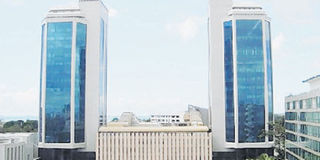Banks give construction, hotels the cold shoulder

Bank of Tanzania headquarters. Tanzanian banks are still giving hotels, restaurants and construction the cold shoulder even as credit to the private sector is recovering. PHOTO | FILE
What you need to know:
Lending to hotels and restaurants accounted for only 3.2 per cent of credit extended to major economic activities by February, this year
Dar es Salaam. The loans extended by Tanzanian banks to hotels and restaurants; and building and construction sectors are still contracting as the credit to private sector is recovering.
Lending to hotels and restaurants accounts for only 3.2 per cent of the outstanding credit extended by banks to major economic activities by February this year while the share of building and construction sector was 4.2 per cent, according to the Bank of Tanzania.
Both sectors are still recording negative growth since September last year even as the credit to the private sector recovered during the last 12 months.
In the year to February this year, hotels had a growth of -4 per cent while that of building and construction was -7.7.
The hotels were increasing in the recent years, thanks to disposable income among Tanzanians and government conferences that created good business for the owners.
However, some experts say the owners had no business experience and did not survive when the government banned conferences and tightened the economy.
“When the current government came with its austerity policies, many businesses fallen and these hotels were hit hard. Their closing down resulted into bad loans among the banks which are now avoiding lending the hoteliers,” says a seasoned banker from one of big banks who preferred anonymity.
The change of wind which started in 2016 with cost-cutting measures affected many hotels in Tanzania. In 2017, several medium-sized hotels switched to student hostel services other than visitor accommodation to avoid more loss making, while key hotels in Bagamoyo, the beach and historical town had signaled loss making fears, with some closing their business.
Building and construction which covers real estate business is also still unattractive to lenders due to the experience the sector is going through.
“It should be noted that most buildings especially in Dar es Salaam are vacant following slowdown of businesses and of course the government shift to Dodoma. Most of big buildings and posh houses were rented by government, diplomats and expatriates who worked with the mining and exploration companies.
“However, recent crackdowns on foreign firms and stringent conditions for work permits have reduced the foreigners and these buildings are not generating enough. For those reasons, no bank can continue issuing loans to struggling customers,” added the banker.
As hotels and construction loans contract, the overall credit growth reached eight per cent in the year to February 2019.
“Growth of credit to the private sector has maintained a steady upward trend since May 2018 reaching 8.0 per cent in February 2019,” states the central bank.
Reports indicate that the annual growth of credit to the private sector was at 1.3 per cent in February 2018.
“The continuing recovery of credit growth reflects the sustained accommodative monetary policy stance, on-going government efforts to improve business environment and credit risk measures taken by banks, including use of credit reference system prior to loan approval,” it adds.
Personal loans which are normally used for small and medium-sized business financing is the leading economic activity which received 28.4 per cent of all loans. It’s followed by trade which accounts for 18.6 per cent and manufacturing which accounted for 11.7 per cent.
Agriculture follows at 8.1 per cent of all loans while transport and communication accounts for 6.8 per cent.
“Personal loans to banks are like bread and butter because it’s an area where there is less risks – especially for public servants. Sometimes there is huge demand from the public servants. So, it’s both the demand and the preference of banks to cover the public servants who are more trusted compared to private sector workers who sometimes face retrenchment for corporates to cope with business environment,” adds the banker.
Way forward
Economists say the lenders should look for ways to improve the credit extension for the welfare of the private sector who is perceived as the engine of the economy.
“There are two ways we can make the credit to grow. Fist by ensuring improved business environment that will facilitate growth of businesses and therefore need for credit. Secondly, Tanzanian banks should do away with business as usual in lending. They need to be pro-business through innovation and finding new areas for lending,” says Prof Delphin Rwegasira of the University of Dar es Salaam economics department.
Tanzania has over 50 banks but over 70 per cent of the market share and assets is controlled by only ten lenders.




